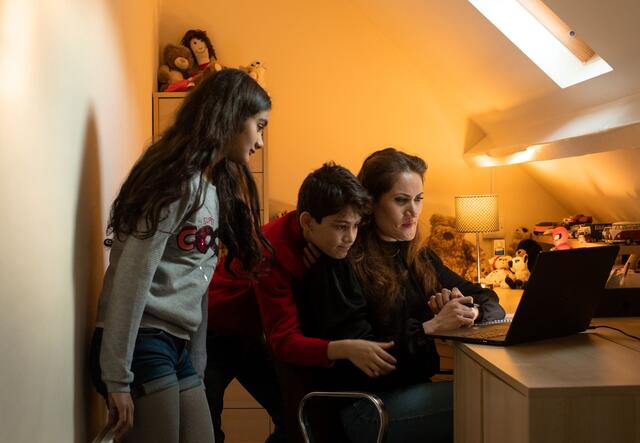UPDATE: In July 2024, the new UK Government announced they have scrapped the inhumane Rwanda Plan.
In April 2022 the UK and Rwanda signed an agreement for the UK to deport people seeking asylum in Britain to Rwanda, known as the ‘Migration and Economic Development Partnership’, or ‘Rwanda Plan’.
In November 2023, the UK Supreme Court ruled the plan to be unlawful as deporting migrants to Rwanda would breach British and international human rights laws and agreements.
In response, the Prime Minister agreed a new treaty with Rwanda and brought forward new legislation - the Safety of Rwanda (Asylum and Immigration) Act - designed to override any legal obstacles and declare the country to be safe.
Here’s everything you need to know about the scheme, and why the UK should not be sending refugees anywhere.
How does the Rwanda Plan work?
Under the scheme, asylum seekers arriving in the UK would be prohibited from asking for protection here, and would instead be sent to Rwanda, where they would be processed under Rwanda’s legal system and would not be able to return to the UK.
No asylum seeker was ever sent, with the first flight cancelled after legal challenges in June 2022.
The scheme was widely criticised as a threat to the welfare of vulnerable people who arrive in the UK, hoping to find safety. MPs from all parties, charities and human rights groups spoke out against the policy.
Everyone has the right to seek asylum and we know that when welcomed, refugees offer huge contributions to their new communities. The UK Government should be protecting and welcoming refugees, not sending them miles away.

Why did the UK Government try to send asylum seekers to Rwanda and who did it apply to?
The former UK Government said that the policy aimed to tackle and deter the business model of people smuggling and ‘small boat crossings’. Guidance from the Home Office previously stated: “The Partnership will see those travelling to the UK through illegal, dangerous, or unnecessary methods considered for relocation to Rwanda, where they will have their asylum claim processed.”
This included all asylum seekers, as there is no way to apply for asylum from outside the country, and no refugee visa to enter the country ‘legally’.
This is in spite of the fact that under the Refugee Convention, of which Britain is a signatory, asylum seekers have the right to apply for asylum in the UK, and not to be penalised for arriving irregularly (as this is often the only option for people in flight). Home Office statistics also show a clear majority of people crossing the Channel go on to be recognised as refugees.
This means that people arriving are already extremely vulnerable and should not be punished for seeking asylum.
Five reasons the UK Government should not be sending refugees anywhere
1. It’s not how we should treat refugees
The response to the recent crises in Ukraine and Afghanistan has made it clear that the British public wants to do more to help people fleeing conflicts. Polling carried out by the IRC and YouGov in June 2023 revealed that 65% of the UK public think it’s important that the right to seek asylum is maintained in the UK. Instead, the Government is creating laws and policies that treat vulnerable people like criminals.
The majority of people seeking asylum have faced multiple traumas in their home countries and along their journey. Sending them miles away will put their mental health and well-being at risk, and the long-term effects could be severe. Instead, new arrivals should be offered dignified reception support, including access to legal representation and tailored medical services.
2. It breaches international obligations
Seeking asylum is a fundamental human right. The UN’s refugee agency, UNHCR, described the agreement as ‘incompatible with the letter and spirit of the 1951 Convention.’ The 1951 Refugee Convention sets out refugees’ rights and the obligations of states to protect them. The UK is a signatory of the Convention, which allows people to seek asylum in any country they choose. The Convention prohibits penalisation on account of irregular entry to a country, meaning that the way a person travels to the UK should not affect their asylum claim.
Asylum seekers in the UK and elsewhere face rigorous application processes before they are given refugee status. Sending asylum seekers from the UK anywhere else to have their asylum claims processed undermines this international law.
3. The UK government should share responsibility for protecting refugees and asylum seekers
With the sad reality that 43.4 million people worldwide are refugees, it is more important than ever that the UK shares responsibility for protecting refugees. It is vital to remember that the vast majority of refugees are hosted in countries neighbouring humanitarian crises and low and middle-income countries, often already enduring high rates of poverty and domestic challenges.
East Africa alone already hosts almost 5 million refugees, but resources are very stretched. For instance, the World Food Programme reports that funding shortfalls mean almost 70 percent of refugees do not receive full food rations. As a leading global economy, the UK Government must do more to contribute to global refugee protection and share responsibility.
4. Evidence shows it is likely to be ineffective
We already know from the experience of other countries that similar policies haven’t worked. For instance, Australia established offshore processing centres for asylum seekers in Papua New Guinea and Nauru. This came at a severe human cost, and arrivals by boat and deaths at sea continued. When Israel relocated refugees and asylum seekers to countries in Africa, this resulted in people making dangerous journeys back to Europe.
Refugees that seek safety in the UK often do so because they have family here or because they speak the language. The most effective way to tackle dangerous journeys would be to expand safe routes. For example, by making it easier for families to reunite and increasing resettlement places.
Read more about safe routes in the UK here.
5. It’s expensive
The UK Government's plan to send refugees from the UK to Rwanda was costly. The Times reports that £20 million was paid to the Government of Rwanda for processing costs, on top of £120 million of development funding already paid. That took the upfront cost up to at least £140 million.
The Government spent a further £100m in the 2023-24 financial year while flights remained grounded amid a series of legal setbacks, according to the BBC.
Instead of deterrence policies, the Government should invest in and resource our asylum system so that it can process applications effectively. We also know from IRC’s experience globally, that once refugees are given a chance to contribute to their new communities, the investment can pay back dividends. Research from the International Rescue Committee has found that closing earnings and employment gaps for refugee men and women in Turkey, Uganda, Lebanon, Jordan, Germany, and the U.S. alone could boost global GDP by $53 billion. We also know that when refugees start businesses they employ locals, pay taxes and generate wealth.
The current rules in the UK mean that most people seeking asylum are not able to find employment until their refugee status is granted. They are frozen out of work and prevented from providing for themselves and their families, trapping them in poverty. We know that 94% of asylum seekers want to work. If the ban on employment for asylum seekers were lifted, it is estimated that the UK economy could gain £333 million per year.
The IRC is part of the #LiftTheBan coalition, which is calling on the UK Government to allow people seeking asylum to work. By allowing this, asylum seekers are able to contribute to the UK’s economy and will be able to support themselves much sooner.
The IRC is calling for a rethink
The IRC is deeply concerned for the welfare of the vulnerable people who arrive in the UK seeking safety and protection. We urge the UK Government not to continue to invest in ineffective and costly deterrence policies, but insteaduphold the right to seek asylum, expand safe routes for refugees, and give new arrivals the support needed for them and their host communities to thrive.
The Government must uphold its commitments to the Refugee Convention and deliver a fair and effective system of protection for everyone.
What is the International Rescue Committee?
The International Rescue Committee (IRC) helps people affected by humanitarian crises to survive, recover and rebuild their lives. We deliver lasting impact by providing health care, helping children learn, and empowering individuals and communities to become self-reliant, always with a focus on the unique needs of women and girls.
Read more about the International Rescue Committee in the UK



